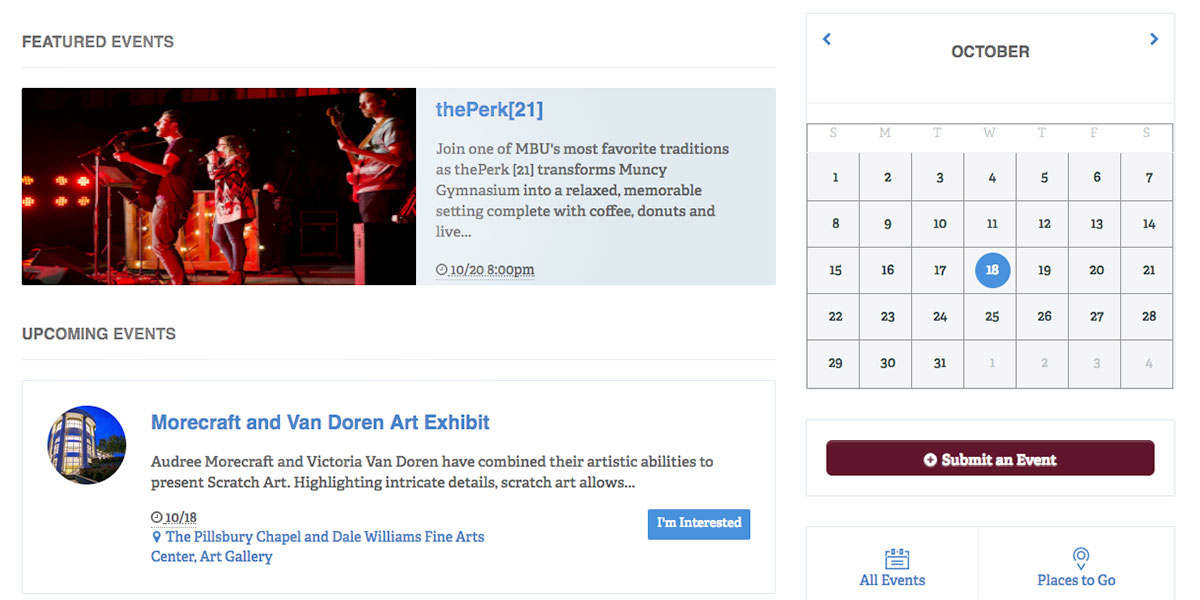New calendaring software is improving Missouri Baptist University’s event communication to students, faculty, staff and other stakeholders.
__________________________________________________
Students at Missouri Baptist University go to class, do their homework, play sports and have fun with friends at events on campus, but they often don’t think about what happens behind the scenes to make everything possible. Staff members at MBU are constantly working to improve the students’ experience and bring in the latest technology to give them the best experience possible. One such change coming to MBU next year is a new calendaring software, created by Localist, a leading calendar software designed to help companies market their events, which will integrate with the university’s website. “It streamlines the way an organization can communicate its events, in this case to our students, and secondarily to prospective students, faculty, staff and all the different stakeholders that we have,” said Bryce Chapman, associate vice president for university communications and marketing. Calling the new software a “one-stop shop,” Chapman said, “We think the design’s going to be really excellent and it will allow us to communicate the many different happenings from athletics to fine arts to clubs and organizations in a pretty singular way.” Beyond internal communication, Chapman also pointed out the external communication benefits. “It’s not password protected so it truly is a part of the mobap.edu domain, so you won’t notice any major differences there, the aesthetics, the design will look the same,” Chapman explained. “It’s very cohesive in that sense. So anyone who goes to our homepage will be able to link to that Localist page.” The new software will simplify communication of events and Terri Adams, director of special events and calendaring, thinks this is one of its biggest benefits. “Easy design to see and also to move around and navigate for users. What I like about it internally, what it does for our students and our faculty and staff internally, is it’s a way to communicate to one another,” Adams said. “Just what’s happening on a daily basis, a monthly basis, even the whole year.” Adams is well aware of the gaps the new software will fill. “We do a great job of having some activities, events and games on campus, but we don’t always communicate it well. And it is, being a small university, it’s grassroots,” Adams said. “We have to take ownership of our events and promote them.” Simplicity and ease of access are the main draws for Adams. However, it’s more than a calendar, as Chapman was quick to point out. “I would describe it more as a digest. So it’s much more robust than what you think of … as an academic or a university calendar. It really allows the student to be interactive with the tool,” Chapman said, “signing up for events, creating events that could be approved by administration, and it integrates with social media.” For students who don’t wish to be inundated with events, Chapman said customization is possible. “One of the great things, the student can filter events and those events will be based on their interest.” According to Chapman, the convenience of this new software goes even farther. “An added feature is that you’re able to download that specific content that you choose to your calendar, so to your phone. If you’re using an iPhone, it would download to your iCal,” Chapman said. Then, if there are changes made to the calendar, users will be apprised of those changes. “So, for example the football season, you may want to download that entire football season to your calendar, but say mid-season a game gets canceled or a game gets pushed up by an hour. Based on this technology that will change in your phone as well,” Chapman explained. The new software rolls out this fall and Adams stressed the importance of students taking ownership and using this software to its full potential at that point. “Not like, ‘Oh, here’s another new thing,’ but, ‘Here’s something we’re doing for all of us to communicate better.’ And it’s not just one person’s responsibility, it’s going to be the shared ownership. I think that’s the biggest thing,” Adams said. “If departments, clubs, organizations use it, it’s shared ownership. It’s not like one person has to do it all. I think it’s important that we do have a uniform way of submitting things and I think it’s going to be helpful.” Chapman’s enthusiasm comes from a place of wanting to make MBU the best it can be. “It’s an investment that we are making in the student life experience. From a strategic communication perspective, it’s incredibly exciting too because it allows us to better tell the full story of MBU and what that looks like on a daily basis because we know that there are significant things happening every day and we want to highlight those events in a way that is fitting,” Chapman said. “And we think this will allow us to do that.”
